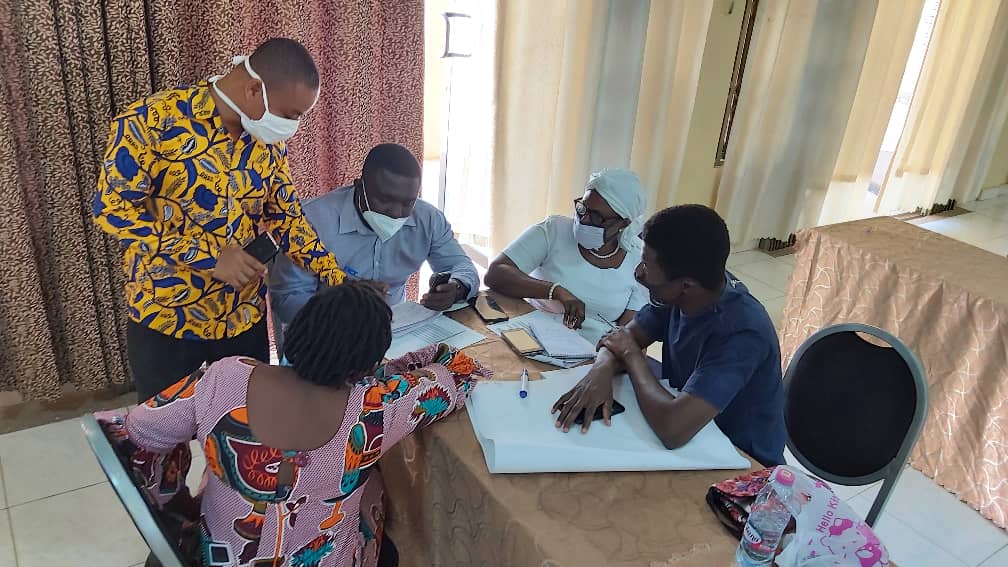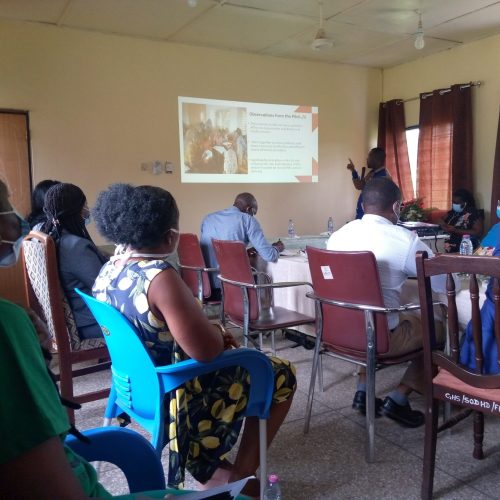Co-authors: Robert Adatsi, Adams Agbeko, Dr Alphonse Dzakpasu, Dr. Nana Enyimayew, Dr. Abdulai Tinorgah, Elizabeth Hammah, Ezinne Ezekwem

Overview
Despite progressive improvements in economic and health indices, evidence suggests Ghana may not achieve its universal health coverage (UHC) target by 2030. The Government of Ghana is implementing a Primary Health Care (PHC) redesign and strengthening program to accelerate progress towards UHC. A crucial part of this effort is the ‘Networks of Practice’ (NoP) strategy, aimed at strengthening primary care nationwide. The NoP initiative builds on a successful pilot conducted in the Volta Region from 2017-2019, which has since been expanded to other regions.
Key Findings
Districts and Communities
- Managers at the network level must reinforce community ownership of health facilities and programs through regular engagement and community scorecards.
Regions
- Regional Directorates should invest time in a structured approach to NoP formation and operation, ensuring adequate sensitization and involvement of stakeholders.
- Critical investments in network infrastructure and staff capacity are necessary, with proactive partnerships to mobilize resources.
- The VRHD should continually explore and share their experiences with other regions to foster mutual learning.

National
- The Ghana Health Service headquarters should collaborate with the Volta Region to document and analyze the implementation progress and develop policy briefs highlighting observed gaps.
- The relational elements in network operations are crucial and should be emphasized in national scale-up efforts.
- Study visits and cross-regional learning should be encouraged and funded.
- Strategic investments, particularly for hub development, are required.
- Policy realignment in areas such as accreditation, credentialing, payment mechanisms, and PHC financing is necessary, although these changes may take time.
Lessons Learned
Gains from the Pilot Set the Foundation for Expansion
The initial pilot in South Dayi and South Tongu districts demonstrated significant improvements in the management and organization of services at the sub-district level. Health facilities were configured into networks using a hub-and-spokes design, with health centers acting as hubs and smaller CHPS compounds or clinics as spokes. Key improvements included:
- Enhanced referral processes across facilities.
- Increased collaboration and teamwork among networks, fostering resource sharing and problem-solving.
- Technical and operational support from senior staff at health centers to lower-level facilities, improving communication and task-shifting policies.
- The critical role of district hospitals in referrals and technical support.
These improvements encouraged the Volta Region to expand the NoP initiative to nine districts by December 2023, leveraging local resources to maintain momentum.
Innovative Approaches, Tools, and Technologies
The Volta Regional Health Directorate established a regional mechanism for scaling up the NoPs, introducing several innovations:
- Regional NoP Technical Team: A multidisciplinary team was formed to lead the scale-up process.
- Systematic and Analytical Approach: The region identified four phases of network evolution (setting up, operating, maturing, and sustaining) and developed assessment tools to ensure networks were well-positioned for each phase.
- Tele-Consultation Center (TCC): Based in Hohoe Regional Hospital, the TCC provided remote guidance for case management, reducing unnecessary patient transfers and improving referral compliance.
The introduction of teleconsultation led to significant improvements, such as reduced unnecessary referrals, better referral compliance, and enhanced communication between facilities and the TCC.
Conclusion
The Volta Region has demonstrated systematic and innovative approaches to scaling up networks for improved primary health care services. Their trajectory reflects the Ghana Health Service’s commitment to encouraging innovation and flexibility within national policy frameworks. The region’s lessons and tools will be instrumental in the success of the national NoP program and can serve as a model for other countries aiming to implement similar initiatives.




